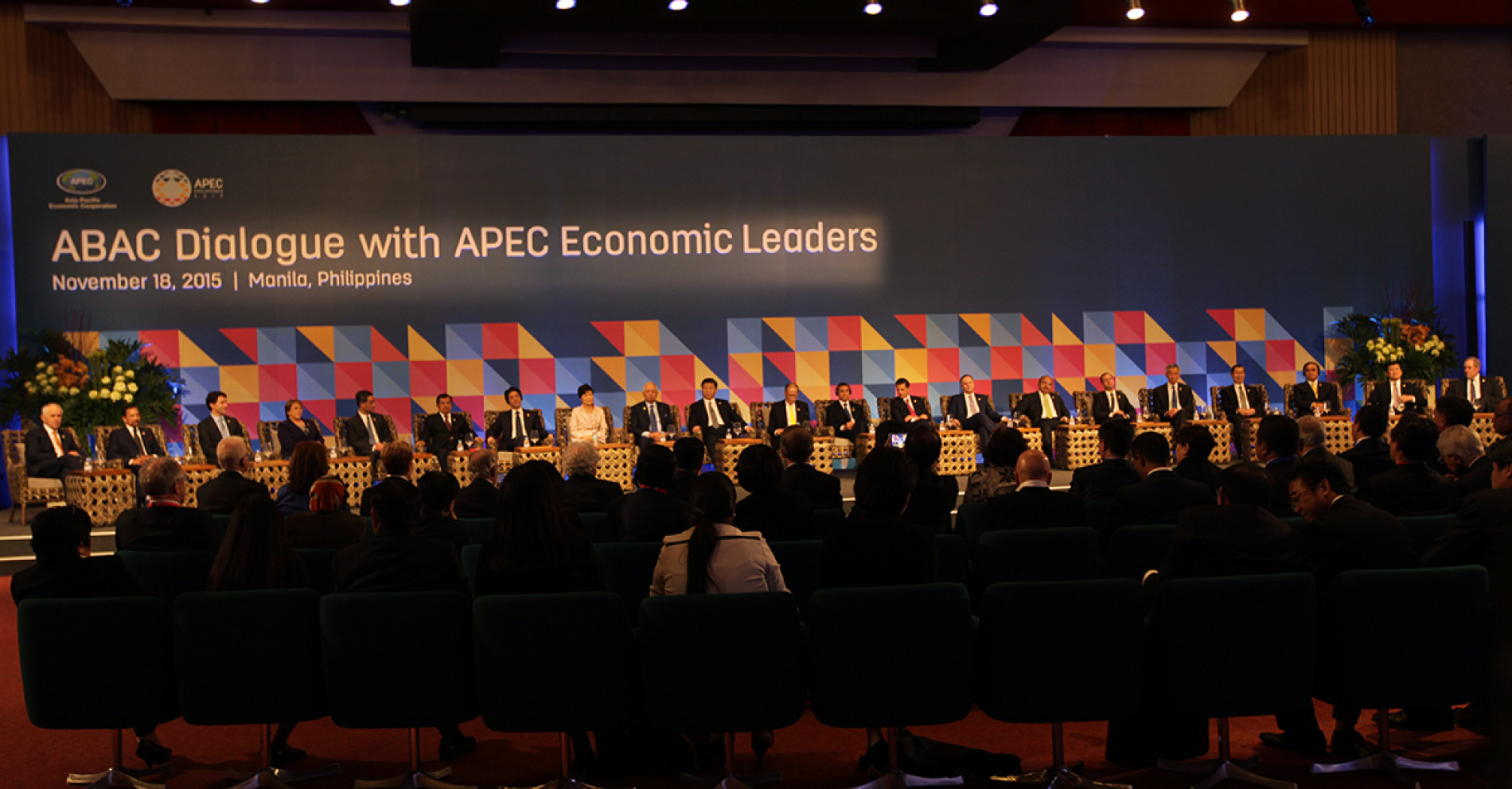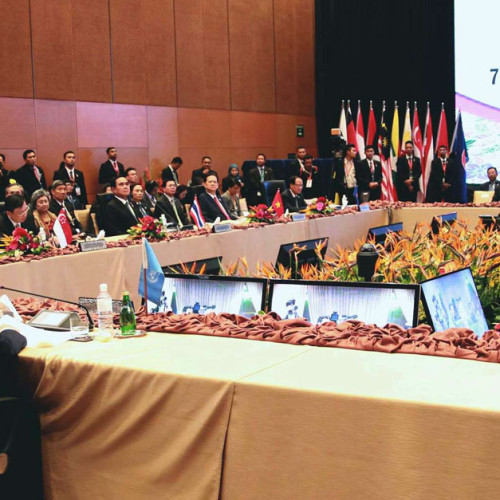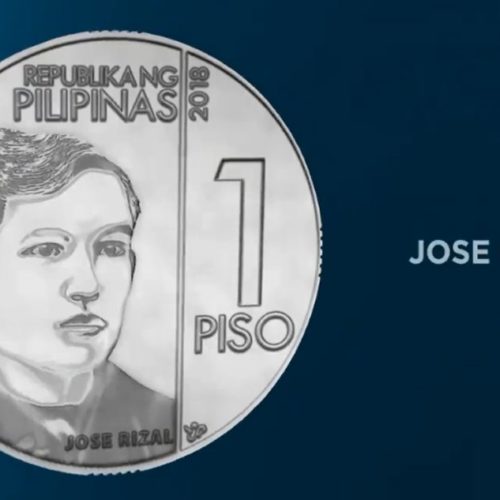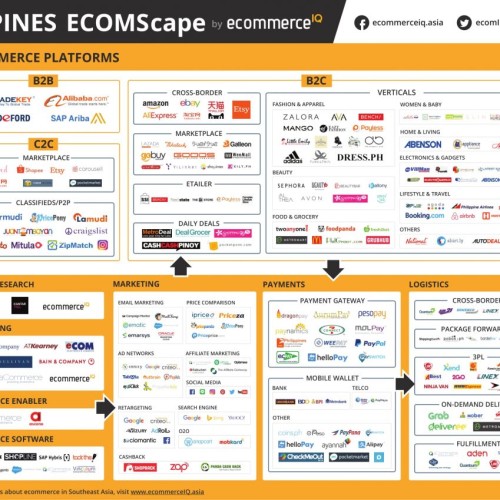President Aquino welcomes APEC leaders at the 2015 ABAC dialogue
Remarks
of
His Excellency Benigno S. Aquino III
President of the Philippines
for the opening of 2015 APEC Business Advisory Council dialogue with Leaders
[Delivered at PICC, Manila, on November 18, 2015]
Excellencies, partners from ABAC, ladies and gentlemen:
Let me begin by putting forward an observation as someone who has worked both in the private and public sectors: the effectivity of government and business is measured by how they cope with disruption.
In fact, we can say that many aspects of our work involve responding to disruption. When natural calamities hit, we have to take immediate actions to make sure we not only secure our people ahead of time, but also build back better afterwards. When there are significant movements in the global economy, we need to revisit our policies to make sure our economies and our companies not only act swiftly to adjust, but remain competitive in a new environment. There is also disruption in a positive sense, where a few innovative companies broaden our technological frontiers, dramatically alter the market, and thus push all other firms to adjust to the new norm. Disruption can also be a strategy to enable government to challenge the status quo, and adopt wide-ranging reforms to make sure that our progress remains equitable.
Our gathering today is an exercise in positive innovation. Confronted by an increasingly complex, interconnected, and unpredictable world, we are all challenged to look at trends that may cause disruption, so that we can act with resilience and craft a response with inclusivity at its core, ensuring no one is left behind. These two elements are at the heart of the report prepared by our friends at ABAC, aptly themed: “Resilient, Inclusive Growth: A Fair Deal for All.”
I will not preempt the presentation of our colleagues from ABAC, but allow me to share with you two points that I have taken to mind as President. First, regardless of the sector you belong to, the work of innovation begins with the correct appreciation of the problem, which leads to the correct crafting of the solution. Policymakers must provide the environment that nurtures this. In turn, this requires the inputs from our business colleagues to maximize the synergy between us.
In this endeavor, the private sector plays a vital role here. In fact, is it not true that much of the success of our business community can be attributed to visionaries identifying problems, and coming up with out-of-the-box solutions? In business parlance, this is known as “finding a need.”
This brings me to my second point: The closer we work together, the more intelligently, efficiently, and swiftly we can evolve to meet the challenges of our increasingly globalized milieu. In my experience as President, I have seen how such partnerships revolutionize the lives of our countrymen and their communities for the better. Case in point: through pilot programs with partners in the private sector, such as Nestle’s NESCAFÉ Plan and the Farmer Entrepreneurship Program of our very own Jollibee, our rural communities have seen farmers trained to be more knowledgeable about their work. By working with the sector that provides them with the ingredients, quality control is also enhanced; farmers, in turn, learn more and earn more and are assured of stable income. This is a win-win situation. What is ignited here and later reinforces is a virtuous cycle of efficiency and shared growth.
To my mind, such efforts are representative of what ABAC and the rest of the APEC Community do for our region: to inspire a sense of possibility and optimism, which gives birth to innovations and new pathways in business, economics, and governance. In other words, evolution borne of innovation takes place. And I must say that by evolving, we become more efficient; and being more efficient, we can better compete and take hold of the opportunities that emerge to grow our markets.
Today, in the various breakout sessions, we will discuss topics, which, in very concrete ways, impact the lives of our peoples and the development of our economies. These are: first, the next steps towards a Free Trade Area of the Asia Pacific (FTAAP); second, the pursuit of region-wide growth through services; third, the expansion of infrastructure finance; fourth, the advancement of MSME growth; and fifth, the promotion of sustainable development, as well as that of the rule of law. In all our discussions, may we invite our leaders and ABAC representatives to share your thoughts and insights in an open and friendly manner, which has become the hallmark of this gathering.
You and I, as leaders of our economies and our respective sectors, have the same mission: to increase prosperity—you for your corporations; and for all of us, for our peoples. Working hand-in-hand enables us to better understand the context that we operate in, formulate the right approaches based on the correct understanding of the problems, and thus lay the groundwork for a more resilient future, one that is sustainable, inclusive, and truly fair.
Thank you. Good day.
[Response to the ABAC report]
Excellencies and partners from ABAC:
Allow me to state that we in APEC are truly grateful for the efforts of ABAC. The report you presented today encourages all of us to find ways to further enhance symmetries between us, and among all economies of our region, towards strengthening trade and investments, and promoting sustainable development and inclusive growth in the Asia-Pacific. By so doing, we open more doors of meaningful opportunity for all our citizens.
At this point, may I invite everyone to the ABAC Dialogue breakout sessions. Thank you.
You might also like
PH has best growth outlook among ASEAN-5 in 2016
According to the 2016 edition of the OECD Economic Outlook for Southeast Asia, China, and India, growth for the ASEAN-5 economies—namely Indonesia, Malaysia, the Philippines, Thailand, and Vietnam—shows “mild moderation,”
Bagong Barya ng Pilipinas
Ang Bangko Sentral ng Pilipinas (BSP) ay pormal na naglunsad ng mga bagong disenyo para sa mga barya sa Pilipinas. Inilalarawan bilang serye ng New Generation Coin, ang mga bagong
Philippine ECOMScape by ecommerce iq
Philippines’ Ecommerce Landscape: 5 Key Takeaways From Philippines’ Online Runway The Philippines, although part of Southeast Asia’s growing ecommerce family, is quite the odd cousin. It’s the only market in







0 Comments
No Comments Yet!
You can be first to comment this post!